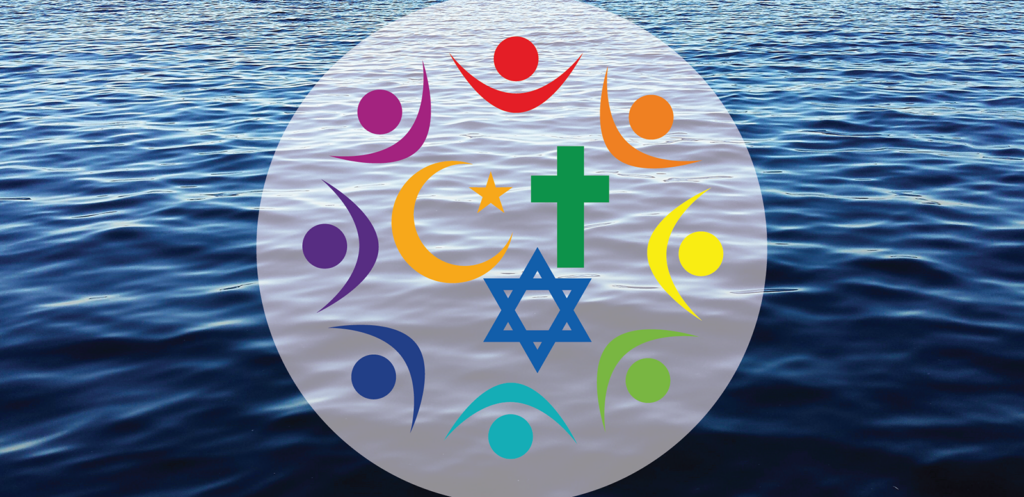When I was growing up in the New York City area
(in northeastern New Jersey to be more precise), my family worshipped at Temple Shalom in River Edge. My parents were active in synagogue leadership and we attended most Friday evening Shabbat services, the High Holy Days of Rosh Hashanah and Yom Kippur; and at thirteen, I had a Bar Mitzvah.
We knew very few Christians. Almost everything I knew about Christianity came, as I flipped through the broadcast channels, from televangelists like Jerry Falwell and Pat Robertson. And what they said was scary; which was that if I didn’t believe as they did, that when I died I would burn in hell for all eternity. Not Good News.
At sixteen, our final year of Jewish Sunday School was a Confirmation Class with the Rabbi, and his answers to too many of our questions didn’t fill me, didn’t satisfy me. I knew there was more out there. And so my journey as a seeker began.
The summer after I graduated from after high school I went to Israel for eight weeks on a trip sponsored by the American Zionist Youth Foundation. We toured both Jewish and Christian sites, and the air was so thick with history it felt as though you could cut it with a knife. A few years later (at twenty-one), I learned Transcendental Meditation, and had the experience of Ps. 46:10 (Be still, and know that I am God). And in college, I majored in and studied comparative religion; and began to understand that almost all of us yearn to understand the Mystery from which we come. We just do it in different ways.
Shortly after her 2006 election and subsequent Installation as Presiding Bishop, The Most Rev. Katharine Jefferts Schori said “For us Christians, Jesus is our doorway to God; but for us to think that God couldn’t possibly act in some other way, is for us humans to put God in a very small box.” This was like music in my ears; because in some ways, it leveled the theological playing field. And the late Rev. Walter R. Bouman, a contributor to the Called to Common Mission Covenant between the Episcopal Church and the Evangelical Lutheran Church in America, said “The agreement between the Episcopal Church and the ELCA is a witness that God is making One, what had previously been divided. Failure to be in full communion with each other is sinful before God, because it means that the denominations are simply brand names competing for a share of the Christian market.”
And it began to dawn on me, that many, maybe even most people, cannot get past the boundaries of their own faith. That instead of seeing nothing more than neutral ecumenical and interreligious differences, they believe that they are right and others are wrong. And two words came to me: theological agoraphobia. A Google search failed to find any online instances of that term; but it spoke to me about a fear of broad and inclusive theology.
And there was a verse I remembered (from Psalm 118:5) which said “Out of my distress I called on the Lord; and the Lord answered me and set me in a broad place.”
The “broad place” (in Hebrew: “merḥav yah“) is often interpreted as a space of “freedom,” “safety,” or “expansiveness” in contrast to the “narrow place” of distress. In biblical imagery, narrowness is often associated with fear, danger, or oppression, while “breadth” signifies deliverance, generosity, and an openness to God’s abundance.
So a broad, inclusive theology resembles that “broad place” and it welcomes diverse perspectives, recognizes mystery, and allows people to encounter God in ways that aren’t confined by rigid boundaries. And this metaphor is particularly powerful because Psalm 118:5 portrays God as the one who places us in the broad place, implying that theological breadth is “God’s gift,” not a human invention.
So theological agoraphobia would be a fear of stepping into that broad place — a kind of anxiety about theological openness, inclusion, or engagement with perspectives outside a familiar, tightly defined framework. And resisting it out of fear can also be seen then as a kind of spiritual agoraphobia.
People experiencing this might worry that inclusive theology undermines orthodoxy or tradition; they might avoid conversations with those outside their tradition; and they might retreat to narrow doctrinal certainties because the “open space” feels threatening, even if it’s ultimately liberating. But we must wonder how it informs our political and partisan perspectives and decisions. Because it must.
So let our experience be the Psalmist’s experience. And let us receive, and welcome, and internalize, and share God’s loving response.
Written by:
The Rev. Mike Wernick
Ecumenical and Interreligious Officer
the Episcopal Diocese of the Great Lakes



One Response
My Episcopal faith provides me with the ingredients and container I need to help me become a loving person and follow the Spirit’s will. I also believe different faiths and spiritual practices can lead others in the same direction. I believe we are all interconnected and need each other to be who we were meant to be. Listening and learning about other beliefs and observing how those beliefs can transform others to become loving individuals can help us understand parts of ourselves we may have been to fearful to explore. The process of being open to others beliefs and experiences can be exciting and challenging but worth the effort. 🙏☮️